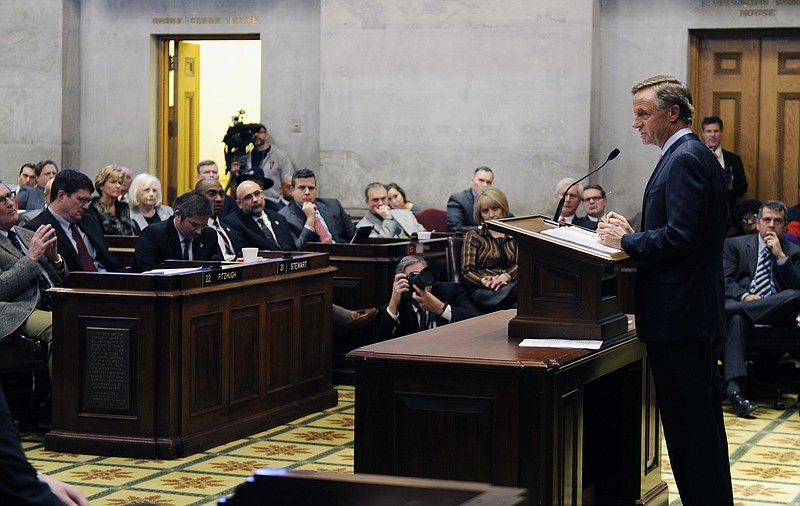Insure Tennessee at a glance:
December 2014: Gov. Bill Haslam proposes implementing Insure Tennessee, a two-pronged approach to providing federally funded health care to hundreds of thousands of low-income Tennesseans. Haslam had worked on a deal with federal health officials for months before announcing the plan.February 2015: Lawmakers kill Insure Tennessee after three days of a special legislative session. Administration officials and other supporters dominated the testimony, but lawmakers discussed their mistrust of the federal government to pay for every cost and their issues in general with the Affordable Care Act.March 2015: Lawmakers try to revive Insure Tennessee during the regular legislative session. They include changes to the proposal that supporters hoped would appease opponents. They did not: Another Senate committee killed the proposal after very little discussion.August 2015: Haslam says he still believes Insure Tennessee is right for the state, but doesn’t sense that enough lawmakers have changed their minds on the plan.
NASHVILLE - Supporters of Insure Tennessee suffered another loss at the hands of the attorney general this week, and Gov. Bill Haslam potentially lost some leverage, in the ongoing debate over expanding health care coverage to low-income Tennesseans.
In a new opinion, Attorney General Herbert Slatery argued Haslam can't implement any form of Medicaid expansion without lawmaker approval.
The opinion probably doesn't change the already tenuous chances for Insure Tennessee to pass next legislative session. Although Haslam reached a deal with federal officials to provide hundreds of thousands of low-income Tennesseans with federally funded health care, fear of the Affordable Care Act and mistrust of the federal government drove the contentious debate.
Haslam repeatedly said he wouldn't pursue any expansion without legislative approval. But supporters of his controversial plan, many of whom packed legislative hearings, wanted Haslam to push forward on his own after it failed in the General Assembly earlier this year.
"Absence of authorization by the General Assembly in the form of a joint resolution would, however, prohibit the governor from making a final decision to bind the State of Tennessee to that agreement or to implement that agreement," the opinion states.
Two years ago, state lawmakers passed a bill that required the governor to receive final approval from the legislature on any plan resembling Medicaid expansion. Senate Democratic Caucus Chairman Jeff Yarbro, D-Nashville, argued that lawmakers were overstepping their authority under the constitution by requiring the governor to receive a "permission slip" before he did his job.
Slatery disagreed, saying the law was constitutional and the governor must allow lawmakers the final say on the plan.
"(The law) does not allow the legislature to exercise any authority that properly belongs to another branch and therefore does not violate the Tennessee Constitution. "
Nothing in state law or in the constitution says final decision-making authority on Medicaid falls to the governor, Slatery added. He also argues that state law requires state lawmakers' approval before the state may use any public funds, even if those funds are provided by the federal government.
Yarbro asked for the attorney general's opinion after lawmakers voted down Haslam's proposal.
"The supermajority wanted to take away some of the governor's power over Medicaid, and the attorney general has now backed them up. Now we get to see whether the supermajority is capable of actually governing," Yarbro said in a statement.
Expansion via executive action is not uncommon. Alaska just expanded Medicaid eligibility earlier this month after Gov. Bill Walker, an independent, sent a letter to the Republican-controlled legislature advising that he planned to accept federal Medicaid expansion funds, as reported by multiple media outlets.
Asked in August about Insure Tennessee, Haslam told reporters he'd still like to see the program discussed in some form.
"But, as I said before, we're not going to charge up that mountain again unless we're convinced that the situation's changed," Haslam said at the time, noting he'd seen little movement from lawmakers.
The General Assembly reconvenes in January.
Reach Dave Boucher at 615-259-8892 and on Twitter @Dave_Boucher1.
